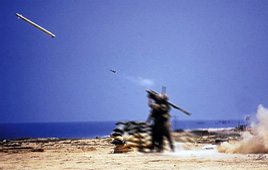The United States has a team of experts on the ground in Libya helping the authorities find missing surface-to-air missiles that could threaten civil aviation, a US official said Friday.
Andrew Shapiro, assistant secretary of state for political and military affairs, said 14 contractors were embedded with Libyan authorities and 50 more were on the way to track down the loose weapons.
“We are very concerned about the threat that is posed and that is why we are taking very possible step,” he told reporters in Brussels after talks with European Union and NATO officials.
“In the wrong hands, these systems known as Man-Portable Air Defence Systems (MANPADS) could pose a threat to civil aviation,” he said.
Former Libyan leader Moamer Kadhafi had a stockpile of 20,000 shoulder-fired missiles before the revolt broke out in February and tracking down the missing weapons is a priority of President Barack Obama’s administration, Shapiro said.
Thousands were destroyed by NATO combat planes and the teams on the ground since September destroyed hundreds more, the US State Department official said.
Shapiro was unable to estimate how many missiles are still missing but he said the contractors on the ground were in the process of assessing how many missiles are still missing.
A military official from Libya’s interim government, the Transitional National Council, said earlier this month that 5,000 surface-to-air missiles are believed to be on the loose.
Libya’s Kadhafi was the country with the biggest stock of MANPADS outside nations that produce these weapons, Shapiro said. The weapons, mainly SAM-7, were acquired in the 1970s and 1980s.
The United States and other allies are concerned that extremist groups such as Al-Qaeda’s north African branch could have seized on the chaos in Libya and take the weapons into neighbouring countries.
“We know that terror groups have expressed interest in obtaining these weapons and obviously it’s an area of considerable concern,” Shapiro said.
Britain is also helping Libyans find the missing weapons, he said, adding that the goal of his talks with EU and NATO officials was to get other allies to contribute to the effort.
There was “broad consensus about the need for urgent action to address the threat” and allies expressed “strong interest” in providing assistance, he said without naming any nations.
Discussions have also taken place with Libya’s neighbours — which are concerned about the proliferation threat — on how to protect the borders, he said.
The United States is allocating around $30 million in efforts to secure Libya’s conventional weapons.
The US contractors — bomb-disposal specialists — have surveyed 20 of Kadhafi’s former ammunition storage areas. They are working to identify all known weapons locations.
The team has swept much of eastern Libya and Tripoli, and will travel to the west “as the situation allows,” he said.










